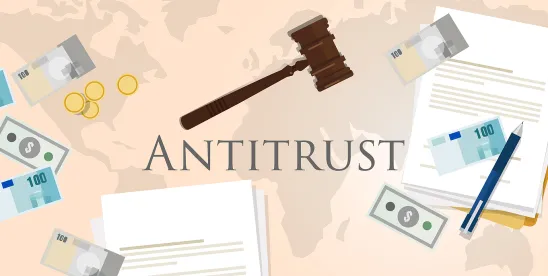Leading up to the U.S. presidential election this November, our Antitrust & Competition team continues to offer insights into what antitrust enforcement may look like under the next presidential administration. As we look forward to the next four years, we should also look back on antitrust enforcement under previous recent administrations. Much has been made of the more aggressive and public stance on antitrust enforcement under the Biden administration. The Federal Trade Commission (“FTC”) and the Department of Justice, Antitrust Division (the “DOJ”) (together the “Agencies”) have put forth several significant policy changes and proposed rules, including new merger guidelines and a proposed ban on noncompetes. All that said, at least some of the data may indicate a less radical change in antitrust enforcement under Biden as compared to Trump than the conventional wisdom suggests.
Merger Enforcement
The Biden administration has been very public about its skepticism of mergers and acquisitions, particularly those among larger players, those in certain industries (e.g., healthcare), and those involving private equity firms. In the first six months of his administration, President Biden issued a forceful executive order reaffirming his administration’s policy to vigorously combat “excessive concentration,” “serial mergers” and “acquisitions of nascent competitors.”[1] Assistant Attorney General for the Antitrust Division, Jonathan Kanter, has similarly taken an aggressive approach against mergers that result in more market power, but less competition.[2] And of course, Chair of the FTC, Lina Khan, has made it abundantly clear that the FTC’s priority is blocking harmful mergers rather than allowing them to proceed with structural remedies.
That said, the numbers suggest a different, or at least a more complicated, story. While the number of reported mergers or acquisitions increased a whopping 53% from 2017 to 2022 (the last year in which official data is currently available), there was no corresponding increase in the number of Second Requests issued by the Agencies. In fact, the absolute number of Second Requests remained relatively static such that the rate of Second Requests relative to the total number of transactions where Second Requests could have been issued steadily declining during the Biden administration as depicted below. (The red graphs represent fiscal years during Trump’s administration and the blue graphs represent fiscal years during Biden’s administration, up to the year that data is publicly available).


That said, there appears to be no discernable change between the number of enforcement actions[4] relative to the number of Second Requests.

Not reflected in the numbers, however, are two significant, related trends in merger enforcement emerging in 2023 and 2024. First, there has been a sharp decrease in the number of merger challenges the Agencies have settled with structural or behavioral remedies, which is consistent with the Biden administration’s view that merger remedies short of blocking the transaction is often inadequate to preserve competition.[6] Second, there has also been a corresponding increase in the number of transactions that have been abandoned by the parties in the face of Agencies’ antitrust concerns. It is also important to note that the numbers above do not account for what has been reported: deals with antitrust issues simply are not proceeding beyond the boardroom at the rate they did under previous administrations. In other words, the Biden administration’s strong rhetoric and policies have created a chilling effect for these types of transactions that is not reflected in the data.
Criminal Antitrust Enforcement
The DOJ’s annual numbers of corporations and individuals charged remained relatively the same across the Trump and Biden administrations. Interestingly, however, the annual number of criminal cases filed actually decreased under Biden as depicted on the right (data publicly available until FY 2023).


Non-Merger Antitrust Enforcement
In addition to merger and criminal enforcement, the Agencies also bring actions under the Sherman Act for a variety of anticompetitive conduct such as price fixing, unlawful monopolizations and attempted monopolizations. The FTC also enforces Section 5 of the FTC Act for unfair methods of competition, which include but are not limited to conduct that violates the Sherman Act.
Again, while the Biden administration has been much more vocal about taking on anticompetitive conduct that leads to rising prices and fewer choices for consumers, the numbers do not indicate a corresponding uptick in enforcement under Biden as compared to Trump.

While the total number of non-merger enforcement actions between the two Agencies has remained relatively static across the two most recent administrations, there have been notable changes in enforcement priorities that are not reflected in these numbers.
First, there has been a notable increase in the number of actions brought by the FTC in particular under FTC Chair Lina Khan. Second, there is a discernable progression over the years in the types of non-merger cases the Agencies focus on. For example, many of the FTC actions brought in 2018 and 2019 challenged reverse payment settlements in the pharmaceutical industry. And beginning in 2023, the FTC prioritized challenges to noncompetes for workers, paving the way in April 2024 for a new Noncompete Rule banning employers from entering into or enforcing noncompetes with their employees.[10] This focus on noncompetes complements the DOJ’s efforts in recent years to target employers for “no-poach” agreements and wage-fixing, as well as the Agencies’ cooperative understanding with the Department of Labor, which allows the Agencies to take a closer look at the impact of proposed mergers on labor markets. Finally, the Agencies are of course currently pursuing significant Section 2 monopolization cases against “Big Tech” companies which will continue into, and no doubt be influenced by the next presidential administration.
FOOTNOTES
[1] President Biden, Executive Order on Promoting Competition in the American Economy (July 9, 2021), Executive Order on Promoting Competition in the American Economy | The White House.
[2] Jonathan Kanter, Assistant Attorney General Jonathan Kanter of the Antitrust Division Delivers Remarks to the New York State Bar Association Antitrust Section (Jan. 24, 2022), Office of Public Affairs | Assistant Attorney General Jonathan Kanter of the Antitrust Division Delivers Remarks to the New York State Bar Association Antitrust Section | United States Department of Justice.
[3] FTC & DOJ Antitrust Division, Hart-Scott-Rodino Annual Reports, Fiscal Years 2017-2022, Annual Competition Reports | Federal Trade Commission (ftc.gov).
[4] FTC and DOJ broadly define “enforcement actions” to include (i) transactions resolved by either consent order or settlement; (ii) transactions in which the Agencies initiated administrative or federal court litigation; and (iii) transactions which resulted in abandonment or restructuring of the transaction as a result of antitrust concerns raised by the Agencies. FTC & DOJ Antitrust Division, Hart-Scott-Rodino Annual Report, Fiscal Year 2022, at 2, Annual Competition Reports | Federal Trade Commission (ftc.gov).
[5] FTC & DOJ Antitrust Division, Hart-Scott-Rodino Annual Reports, Fiscal Years 2017-2022, Annual Competition Reports | Federal Trade Commission (ftc.gov).
[6] E.g., Jonathan Kanter, Assistant Attorney General Jonathan Kanter of the Antitrust Division Delivers Remarks to the New York State Bar Association Antitrust Section (Jan. 24, 2022), Office of Public Affairs | Assistant Attorney General Jonathan Kanter of the Antitrust Division Delivers Remarks to the New York State Bar Association Antitrust Section | United States Department of Justice.
[7] DOJ, Antitrust Division, Corporations & Individuals Charged, Antitrust Division | Corporations & Individuals Charged (justice.gov) (last visited 9/5/2024).
[8] DOJ, Antitrust Division, Total Criminal Cases Filed, Antitrust Division | Total Criminal Cases Filed (justice.gov) (last visited 9/5/2024).
[9] FTC, Legal Library: Cases and Proceedings, Cases and Proceedings | Federal Trade Commission (ftc.gov) (last visited 9/5/2024); DOJ, Antitrust Case Filings, Antitrust Division | Antitrust Case Filings | United States Department of Justice (last visited 9/5/2024).
[10] FTC, FTC Announces Rule Banning Noncompetes (April 23, 2024), FTC Announces Rule Banning Noncompetes | Federal Trade Commission.




 />i
/>i
